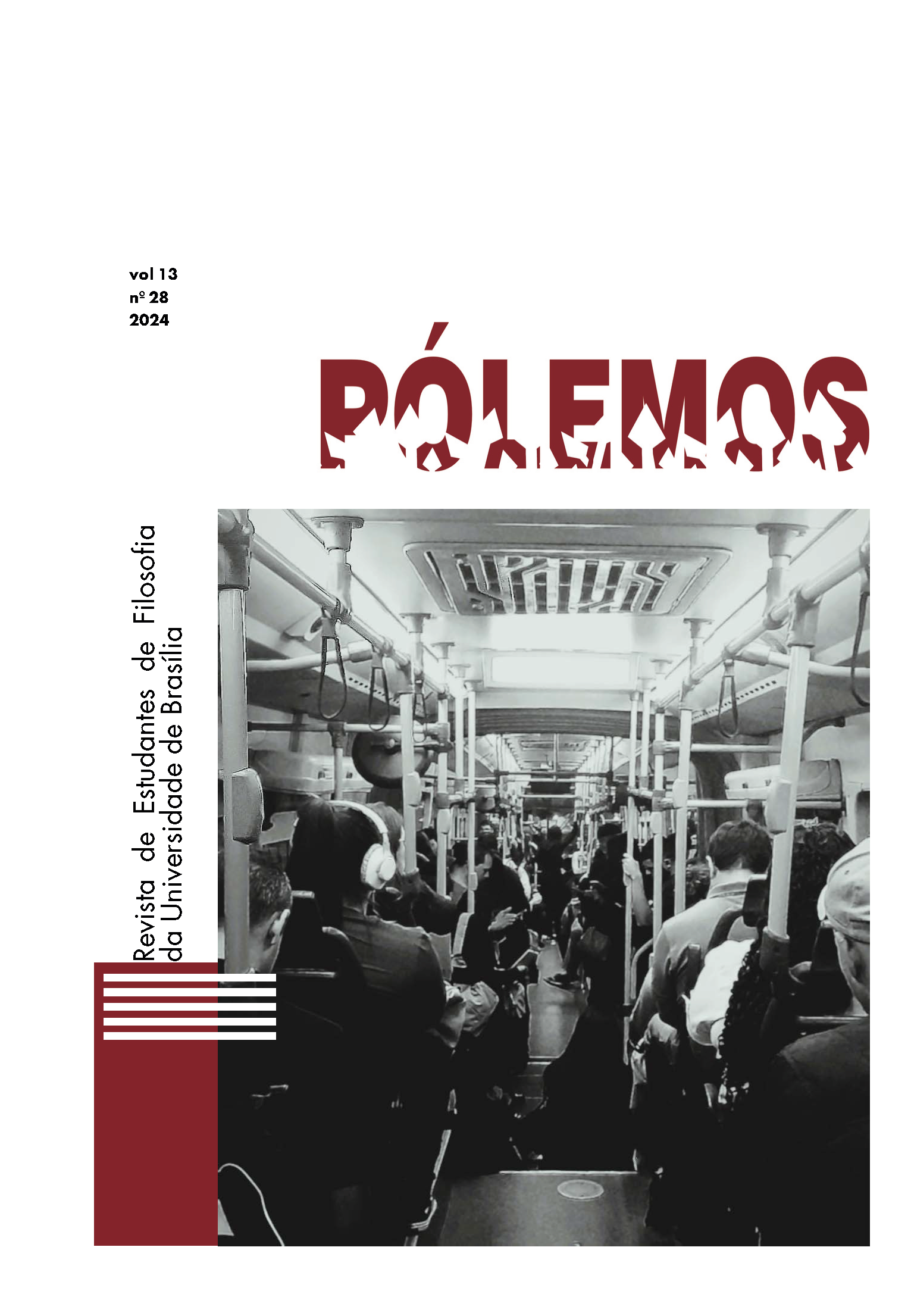SOBRE O CRITÉRIO DE SIGNIFICADO EMPÍRICO DE CARNAP À LUZ DA CRÍTICA DE KAPLAN
DOI:
https://doi.org/10.26512/pl.v13i28.54059Palavras-chave:
Significância Empírica. Carnap. Kaplan. Abordagem Estrutural-Metodológica.Resumo
Neste artigo apresento a proposta de Carnap sobre um possível critério para a significância empírica. Mostramos que a proposta carnapiana consiste na interpretação parcialmente semântica de um sistema formal que representaria a linguagem total da ciência. Além disso, consideramos a crítica de Kaplan a abordagem estrutural-metodológico do pensador. Objetivamos, assim, tão somente, levantar considerações sobre o critério de significância empírica de Carnap à luz das ressalvas de Kaplan. Desse modo, dividimos o artigo em três seções. Inicialmente apresentamos um esboço do debate filosófico sobre a significância empica, para, então, apresentarmos a proposta de Carnap. Por fim, expomos as considerações de Kaplan e sua força na tese carnapiana. Defendemos, ao final, que as críticas de Kaplan são pouco intuitivas e é possível contorná-las.
Downloads
Referências
ANDERSON, C. David Kaplan: Formal Aspects of His Work. In: ALMOG, Joseph; LEONARDI, P (Eds.). The Philosophy of David Kaplan. Nova Iorque: Oxford University press, 2009, pp. 11-24.
ANDREAS, H. A modal view of the semantics of theoretical sentences. Synthese, v. 174, n. 3, p. 367–383, 2010. DOI: https://doi.org/10.1007/s11229-009-9458-3.
ANDREAS, H; SCHIEMER, G. Modal Structuralism with Theoretical Terms. Erkenntnis, v. 88, n. 2, p. 721-745, 2021. DOI: https://doi.org/10.1007/s10670-021-00378-w.
AYER, A. Language, Truth and Logic. 1. ed. Londres: Penguin Books, 1971.
AYER, A. Language, Truth, and Logic. 2. ed. New York: Dover Publications Inc., 1946.
BELNAP, N. On rigorous definitions. Philosophical Studies, v. 72, p. 115–146, 1993. DOI: https://doi.org/10.1007/.
CARNAP, R. Intellectual Autobiography. In: SCHILPP, P. A. (Ed.). The philosophy of Rudolf Carnap. LaSalle, IL: Open Court, 1963a, pp. 3–86.
CARNAP, R. Replies and systematic expositions. In: SCHILPP, P. A. (Ed.). The philosophy of Rudolf Carnap. LaSalle, IL: Open Court, 1963b, pp. 859–1013.
CARNAP, R. The elimination of metaphysics through logical analysis of language. In: AYER, A. (Org.). Logical Positivism. New York: Free Press, 1959, pp. 60-81.
CARNAP, R. Testability and meaning. Philosophy of Science, v. 3, n. 4, 1936, p. 419–471. DOI: https://doi.org/10.1086/286432.
CARNAP, R. Testability and meaning–continued. Philosophy of Science, v. 4, n. 1, 1937, p. 1–40. DOI: https://doi.org/10.1086/286443.
Carnap, R. Empiricism, Semantics and Ontology. Revue Internationale de Philosophie, v. 4, n. 11, 1950, p. 20-40. Disponível em: http://www.jstor.org/stable/23932367. Acesso em: 14 de out. 2024.
CHURCH, A. Review of the Second Edition of Language, Truth and Logic. Journal of Symbolic Logic, v. 14, p. 52–53, 1949. DOI: https://doi.org/10.2307/2268980.
DEMOPOULOS, W. Carnap on the rational reconstruction of scientific theories. In: FRIEDMAN, M.; CREATH, R. (Eds.). The Cambridge Companion to Carnap. Cambridge: Cambridge University Press, 2007, pp. 248–272.
EVANS, M. The relativity of simultaneity: a critical analysis. Dialectica, v. 16, p. 61-82, 1962. DOI: https://doi.org/10.1111/j.1746-8361.1962.tb01671.x.
FRIEDMAN, M. Carnap on theoretical terms: structuralism without metaphysics. Synthese, v. 180, n. 2, p. 249–263, 2011. DOI: https://doi.org/10.1007/s11229-009-9604-y.
GLYMOUR, C. Theory and Evidence. Princeton: Princeton University Press, 1980.
HEMPEL, C. Problems and changes in the empiricist criterion of meaning. Revue Internationale de Philosophie, v. 41, n. 11, p. 41-63, 1950. Disponível em: http://www.jstor.org/stable/23932368. Acesso em: 14 de out. 2024.
HEMPEL, C. Aspects of Scientific Explanation and other Essays in the Philosophy of Science. The Free Press, 1965.
LEWIS, D. Ayer's First Empiricist Criterion of Meaning: Why Does it Fail?. Analysis, v. 48, n. 1, p. 1-3, 1988. DOI: https://doi.org/10.2307/3328286.
LUTZ, S. Carnap on Empirical Significance. Synthese, v. 194, n. 1, p. 217-252, 2017. DOI: https://doi.org/10.1007/s11229-014-0561-8.
LUTZ, S. Criteria of empirical significance. Foundations, relations, applications, quaestiones infinitae. Publications of the Zeno Institute of Philosophy, vol. LXX. Utrecht: University Utrecht, 2012.
NIDDITCH, P. A defence of Ayer's verifiability principle against church's criticism. Mind, v. 70, n. 277, p. 88-89, 1961. DOI: https://doi.org/10.1093/mind/LXX.277.88.
POPPER, K. A lógica da investigação científica. In.: Mariconda, P. (org.). Os pensadores. São Paulo: Abril S. A Cultural e Industrial, 1975. XLIV, pp. 263-384.
PSILLOS, S. Ramsey’s Ramsey-sentences. In: GALAVOTTI, M. C. (Eds.). Cambridge and Vienna. Vienna Circle Institute Yearbook [2004], vol. 12. Springer, Dordrecht, 2006, pp. 67-90.
RAMSEY, F. Theories. In: BRAITHWAITE, B. (Ed.). The Foundations of Mathematics and Other Logical Essays. Routledge Kegan & Paul, 1931, pp. 212-236.
ROZEBOOM, W. A Note on Carnap’s Meaning Criterion. Philosophical Studies: An International Journal for Philosophy in the Analytic Tradition, v. 11, n. 3, p. 33–38, 1960. DOI: https://doi.org/10.1007/BF01324399.
SHILICK, M. Sentido e Verificação. In.: Mariconda, P. (org.). Os pensadores. São Paulo: Abril S. A Cultural e Industrial, 1975, XLIV, pp. 89-116.
WÓJCICKI, R. Semantical Criteria of Empirical Meaningfulness. Studia Logica: An International Journal for Symbolic Logic, v. 19, p. 75–109, 1966. DOI: https://doi.org/10.1007/BF02186728.
Downloads
Publicado
Como Citar
Edição
Seção
Licença
Copyright (c) 2024 PÓLEMOS – Revista de Estudantes de Filosofia da Universidade de Brasília

Este trabalho está licenciado sob uma licença Creative Commons Attribution-NonCommercial-NoDerivatives 4.0 International License.
Todos os trabalhos que forem aceitos para publicação, após o devido processo avaliativo, serão publicados sob uma licença Creative Commons, na modalidade Attribution-NonCommercial-NoDerivatives 4.0 International Public License (CC BY-NC-ND 4.0). Esta licença permite que qualquer pessoa copie e distribua a obra total e derivadas criadas a partir dela, desde que seja dado crédito (atribuição) ao autor / Ã autora / aos autores / às autoras.


